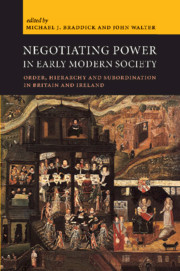Book contents
- Frontmatter
- Contents
- Notes on contributors
- Acknowledgements
- List of abbreviations and conventions
- Introduction. Grids of power: order, hierarchy and subordination in early modern society
- 1 Ordering the body: illegitimacy and female authority in seventeenth-century England
- 2 Child sexual abuse in early modern England
- 3 Sex, social relations and the law in seventeenth- and eighteenth-century London
- 4 Exhortation and entitlement: negotiating inequality in English rural communities, 1550–1650
- 5 Public transcripts, popular agency and the politics of subsistence in early modern England
- 6 ‘Bragging and daring words’: honour, property and the symbolism of the hunt in Stowe, 1590–1642
- 7 Administrative performance: the representation of political authority in early modern England
- 8 Negotiating order in early seventeenth-century Ireland
- 9 Order, orthodoxy and resistance: the ambiguous legacy of English puritanism or just how moderate was Stephen Denison?
- 10 Making orthodoxy in late Restoration England: the trials of Edmund Hickeringill, 1662–1710
- Notes
- Index
7 - Administrative performance: the representation of political authority in early modern England
Published online by Cambridge University Press: 13 March 2010
- Frontmatter
- Contents
- Notes on contributors
- Acknowledgements
- List of abbreviations and conventions
- Introduction. Grids of power: order, hierarchy and subordination in early modern society
- 1 Ordering the body: illegitimacy and female authority in seventeenth-century England
- 2 Child sexual abuse in early modern England
- 3 Sex, social relations and the law in seventeenth- and eighteenth-century London
- 4 Exhortation and entitlement: negotiating inequality in English rural communities, 1550–1650
- 5 Public transcripts, popular agency and the politics of subsistence in early modern England
- 6 ‘Bragging and daring words’: honour, property and the symbolism of the hunt in Stowe, 1590–1642
- 7 Administrative performance: the representation of political authority in early modern England
- 8 Negotiating order in early seventeenth-century Ireland
- 9 Order, orthodoxy and resistance: the ambiguous legacy of English puritanism or just how moderate was Stephen Denison?
- 10 Making orthodoxy in late Restoration England: the trials of Edmund Hickeringill, 1662–1710
- Notes
- Index
Summary
At the Easter quarter sessions in Shropshire in 1635 two justices of the peace exchanged words over a grand jury presentment. Timothy Tourneur rebuked the jurymen for being ‘Busie’, that is of using their office to intrude into areas that were not their proper concern. Sir John Corbet came to their defence, calling for the reading of the Petition of Right and accusing Tourneur of being ‘teachie’ or ‘touchie’ when he objected. There was some tartness in the exchange, but the ramifications seem to have been out of all proportion to what was said. Corbet and one other justice were imprisoned prior to an appearance before the Privy Council. On appearance they, and the jurymen, were required to make public apologies. Corbet's refusal to do so resulted in his imprisonment in London throughout the summer, during a plague outbreak. He was subsequently dismissed from the Commission of the Peace, and his release from imprisonment was conditional upon entering a bond to answer a suit in Star Chamber. Some time later, however, Corbet had an opportunity for revenge when he was elected to parliament in 1640. He petitioned the Commons citing a number of grievances relating to the episode and met with a sympathetic reaction which led to the impeachment of the lord lieutenant and all the privy councillors who had signed warrants for his arrest. At that point, Corbet's public disagreement with Tourneur had become a matter of national political importance, and Bridgewater, the lord lieutenant in question, had to take considerable pains to present his defence.
- Type
- Chapter
- Information
- Negotiating Power in Early Modern SocietyOrder, Hierarchy and Subordination in Britain and Ireland, pp. 166 - 187Publisher: Cambridge University PressPrint publication year: 2001
- 2
- Cited by

